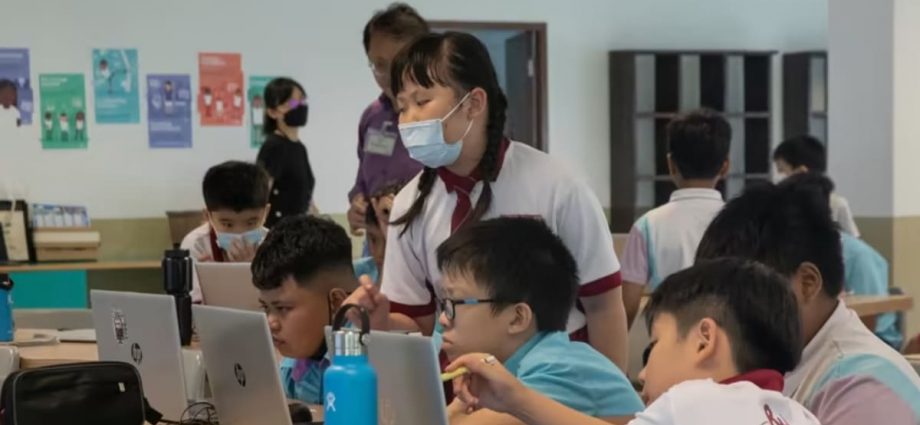
Within general education schools, the professional development of teachers has also improved, allowing them to better identify and employ teaching strategies for children with special needs, said industry players.
Since 2005, teachers undergoing training have been provided with a basic understanding of supporting special needs students. A core group of teachers are also put through a specialised programme – known as the Teachers trained in Special Needs programme – to support students with special needs.
Mr Calvin Chew, who spent more than a decade at St Andrew’s Autism School as an educator, said that the move in 2019 to make it compulsory for all children with moderate to severe special needs to attend a government-funded special education school was a key change in the sector as well.
It meant that the education system had to improve its existing resources and infrastructure to accommodate more children with special needs, said Mr Chew, who has also been a teacher in mainstream schools for close to a decade.
Prior to that, parents were not required to send their children who had moderate to severe special needs to school.
In 2020, MOE also launched The Journeys Package, a framework to provide greater clarity and more distinct progression pathways for educator roles in the special needs education sector.
The framework was an “overhaul” of the sector, improving its professionalism and providing teachers with progression and recognition, said Mr Chew.
Within mainstream schools, allied educators providing learning and behavioural support were also renamed as Special Educational Needs (SEN) officers last year. The move was significant as it signalled a recognition that there is a need for dedicated officers to serve children with special needs, he added.
SEN officers support students with special education needs in mainstream schools.
CHANGES IN THE SPECIAL EDUCATION LANDSCAPE
The special education system in Singapore has progressed from a decade ago, both in terms of the quality of education provided to students, as well as the level of inclusivity and interaction between special needs students and their mainstream counterparts, said industry players.
Ms Esther Kwan, the principal of special education school Grace Orchard School, said that the entire sector has moved from a “care-based sector”, where the focus is on caring for special needs children and teaching them simple skills, to one that is focused on the educational outcomes of the child, so that students can grow to be “as much as they can be”.
Her school takes in students with mild intellectual disability and mild autism spectrum disorders between the ages of seven and 18.
This year, Grace Orchard School started a pilot programme to group its students based on their cognitive skills and abilities, rather than their language and mathematical skills.
Ms Kwan said that this is part of the school’s efforts to implement a mediated learning experience, where the curriculum focuses on improving the thinking process of students, rather than simply having them give the right answer to a problem.
Interactions between special needs and mainstream students have also improved, said teachers.
For example, Bukit Merah Secondary School and APSN Tanglin School have expanded the scope of joint activities for their students since they set up their satellite partnership in 2018.
APSN Tanglin School caters to students between 13 and 16 years old with mild intellectual disability and significant limitations in adaptive behaviour such as social skills.
Located along Alexandra Road, it is about a 15-minute walk away from Bukit Merah Secondary School in Lengkok Bahru.
In 2018, both schools took part in Play Inclusive, a sports competition organised by Special Olympics Singapore and SportCares, where athletes with intellectual disabilities team up with those without to participate in sports.
A year later, they also participated in similar activities for dance and sailing. Students from APSN Tanglin School also visited Bukit Merah Secondary School for the latter’s sports day.
This year, Bukit Merah Secondary School will visit APSN Tanglin School in May to observe the latter’s sports day for the first time. Both sides are also exploring the possibility of activities between student leaders of both schools.
For the first time, teachers from both schools also met to share about their own experiences teaching children with special needs.
Such moves help to build inclusivity on both sides, said the teachers.
Mr Kenneth Lai, the head of department for Physical Education and Sports at APSN Tanglin School who also oversees the partnership, said that the joint activities allow his students to be more comfortable interacting with students from general education schools.
This helps to build their communication skills, which in future will enable them to “speak to people, voice their views, and ask for help” in society, he said.
Mr Lai’s counterpart at Bukit Merah Secondary School, Mr Zubi Kek Boon Ann, said that there is an “overwhelming response” from his students to participate in such joint activities as they enjoy the opportunity to make new friends.

